Impact of Loneliness, Depression, and Sociability on Indian Elders
VerifiedAdded on 2023/06/03
|30
|13139
|480
Report
AI Summary
This report delves into the critical issues of loneliness, depression, and sociability (LDS) among older adults in India. It explores the increasing numbers of elderly individuals and the associated mental health challenges, including the impact of social isolation and lack of family support. The report examines the concepts of loneliness, depression, and sociability, providing definitions and exploring their interconnections. It reviews existing literature to understand the causes and consequences of these issues, focusing on factors like religious beliefs, physical health, and socioeconomic status. The research methodology is outlined, including sample size and sampling methods. The report also discusses coping mechanisms and strategies to address LDS in older adults, emphasizing the importance of social connections and mental well-being. Ultimately, the study aims to offer a comprehensive understanding of LDS in the Indian context, contributing to the development of effective interventions and support systems for the elderly population. The document is available on Desklib, a platform providing AI-based study tools for students.
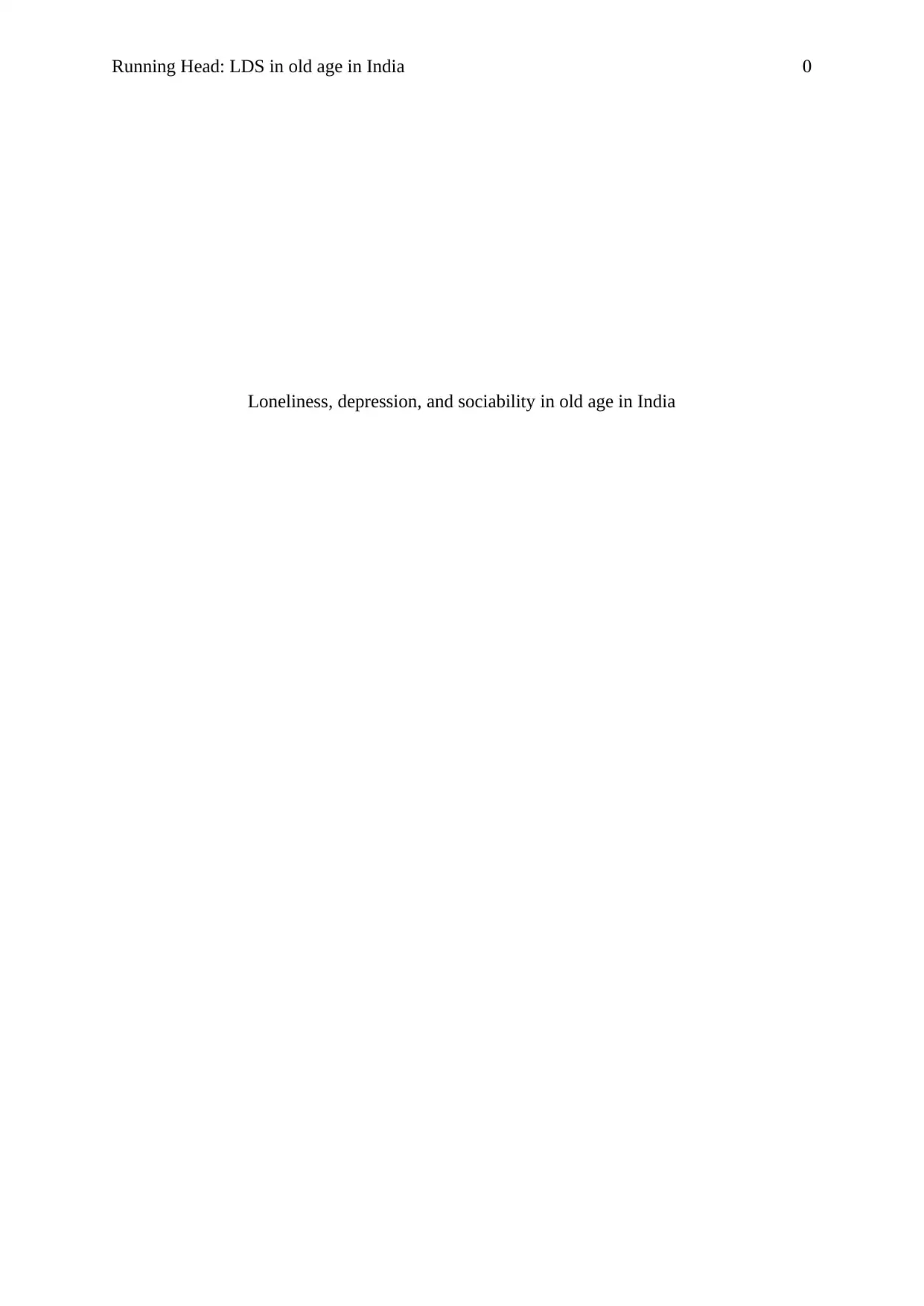
Running Head: LDS in old age in India 0
Loneliness, depression, and sociability in old age in India
Loneliness, depression, and sociability in old age in India
Paraphrase This Document
Need a fresh take? Get an instant paraphrase of this document with our AI Paraphraser
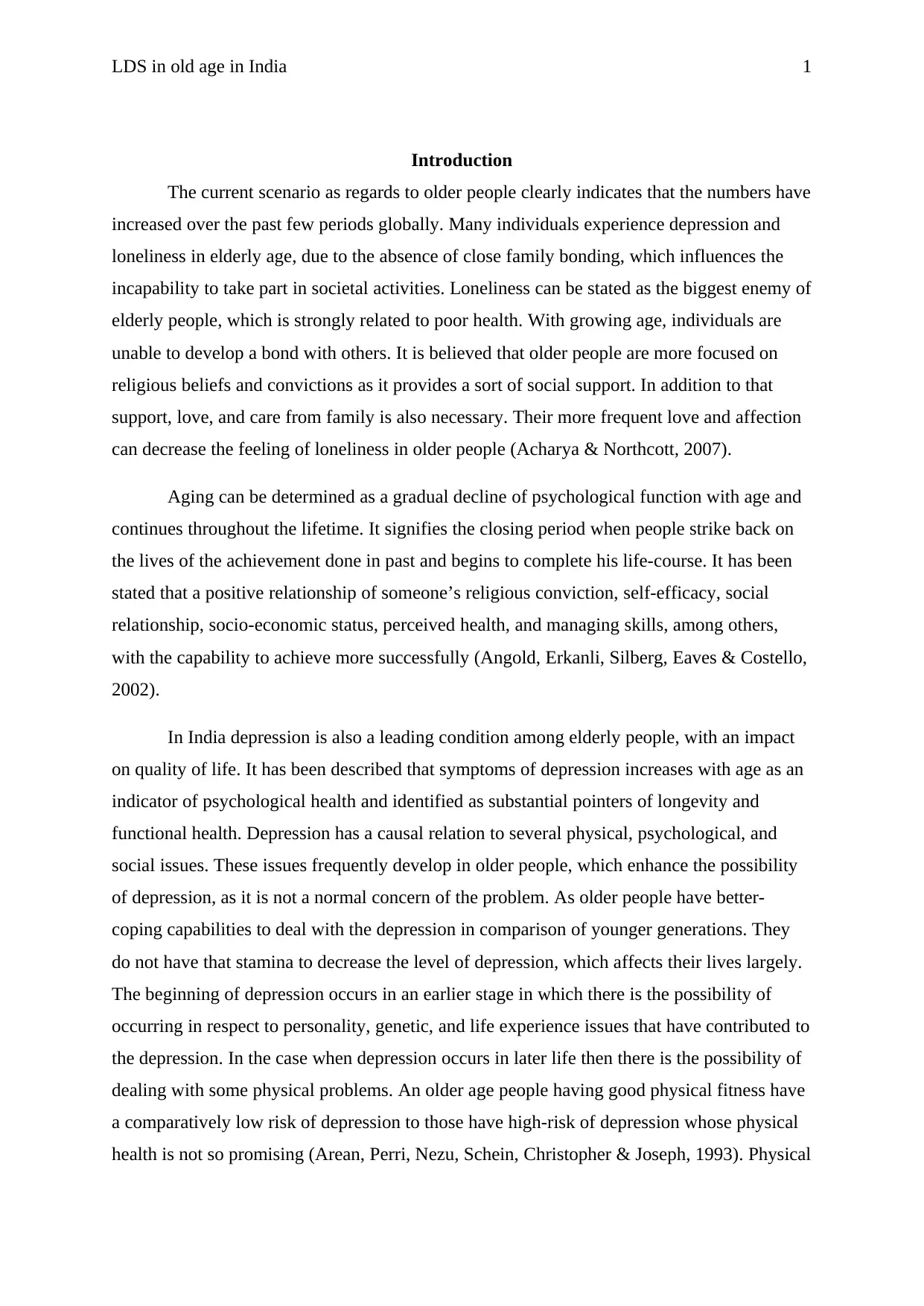
LDS in old age in India 1
Introduction
The current scenario as regards to older people clearly indicates that the numbers have
increased over the past few periods globally. Many individuals experience depression and
loneliness in elderly age, due to the absence of close family bonding, which influences the
incapability to take part in societal activities. Loneliness can be stated as the biggest enemy of
elderly people, which is strongly related to poor health. With growing age, individuals are
unable to develop a bond with others. It is believed that older people are more focused on
religious beliefs and convictions as it provides a sort of social support. In addition to that
support, love, and care from family is also necessary. Their more frequent love and affection
can decrease the feeling of loneliness in older people (Acharya & Northcott, 2007).
Aging can be determined as a gradual decline of psychological function with age and
continues throughout the lifetime. It signifies the closing period when people strike back on
the lives of the achievement done in past and begins to complete his life-course. It has been
stated that a positive relationship of someone’s religious conviction, self-efficacy, social
relationship, socio-economic status, perceived health, and managing skills, among others,
with the capability to achieve more successfully (Angold, Erkanli, Silberg, Eaves & Costello,
2002).
In India depression is also a leading condition among elderly people, with an impact
on quality of life. It has been described that symptoms of depression increases with age as an
indicator of psychological health and identified as substantial pointers of longevity and
functional health. Depression has a causal relation to several physical, psychological, and
social issues. These issues frequently develop in older people, which enhance the possibility
of depression, as it is not a normal concern of the problem. As older people have better-
coping capabilities to deal with the depression in comparison of younger generations. They
do not have that stamina to decrease the level of depression, which affects their lives largely.
The beginning of depression occurs in an earlier stage in which there is the possibility of
occurring in respect to personality, genetic, and life experience issues that have contributed to
the depression. In the case when depression occurs in later life then there is the possibility of
dealing with some physical problems. An older age people having good physical fitness have
a comparatively low risk of depression to those have high-risk of depression whose physical
health is not so promising (Arean, Perri, Nezu, Schein, Christopher & Joseph, 1993). Physical
Introduction
The current scenario as regards to older people clearly indicates that the numbers have
increased over the past few periods globally. Many individuals experience depression and
loneliness in elderly age, due to the absence of close family bonding, which influences the
incapability to take part in societal activities. Loneliness can be stated as the biggest enemy of
elderly people, which is strongly related to poor health. With growing age, individuals are
unable to develop a bond with others. It is believed that older people are more focused on
religious beliefs and convictions as it provides a sort of social support. In addition to that
support, love, and care from family is also necessary. Their more frequent love and affection
can decrease the feeling of loneliness in older people (Acharya & Northcott, 2007).
Aging can be determined as a gradual decline of psychological function with age and
continues throughout the lifetime. It signifies the closing period when people strike back on
the lives of the achievement done in past and begins to complete his life-course. It has been
stated that a positive relationship of someone’s religious conviction, self-efficacy, social
relationship, socio-economic status, perceived health, and managing skills, among others,
with the capability to achieve more successfully (Angold, Erkanli, Silberg, Eaves & Costello,
2002).
In India depression is also a leading condition among elderly people, with an impact
on quality of life. It has been described that symptoms of depression increases with age as an
indicator of psychological health and identified as substantial pointers of longevity and
functional health. Depression has a causal relation to several physical, psychological, and
social issues. These issues frequently develop in older people, which enhance the possibility
of depression, as it is not a normal concern of the problem. As older people have better-
coping capabilities to deal with the depression in comparison of younger generations. They
do not have that stamina to decrease the level of depression, which affects their lives largely.
The beginning of depression occurs in an earlier stage in which there is the possibility of
occurring in respect to personality, genetic, and life experience issues that have contributed to
the depression. In the case when depression occurs in later life then there is the possibility of
dealing with some physical problems. An older age people having good physical fitness have
a comparatively low risk of depression to those have high-risk of depression whose physical
health is not so promising (Arean, Perri, Nezu, Schein, Christopher & Joseph, 1993). Physical
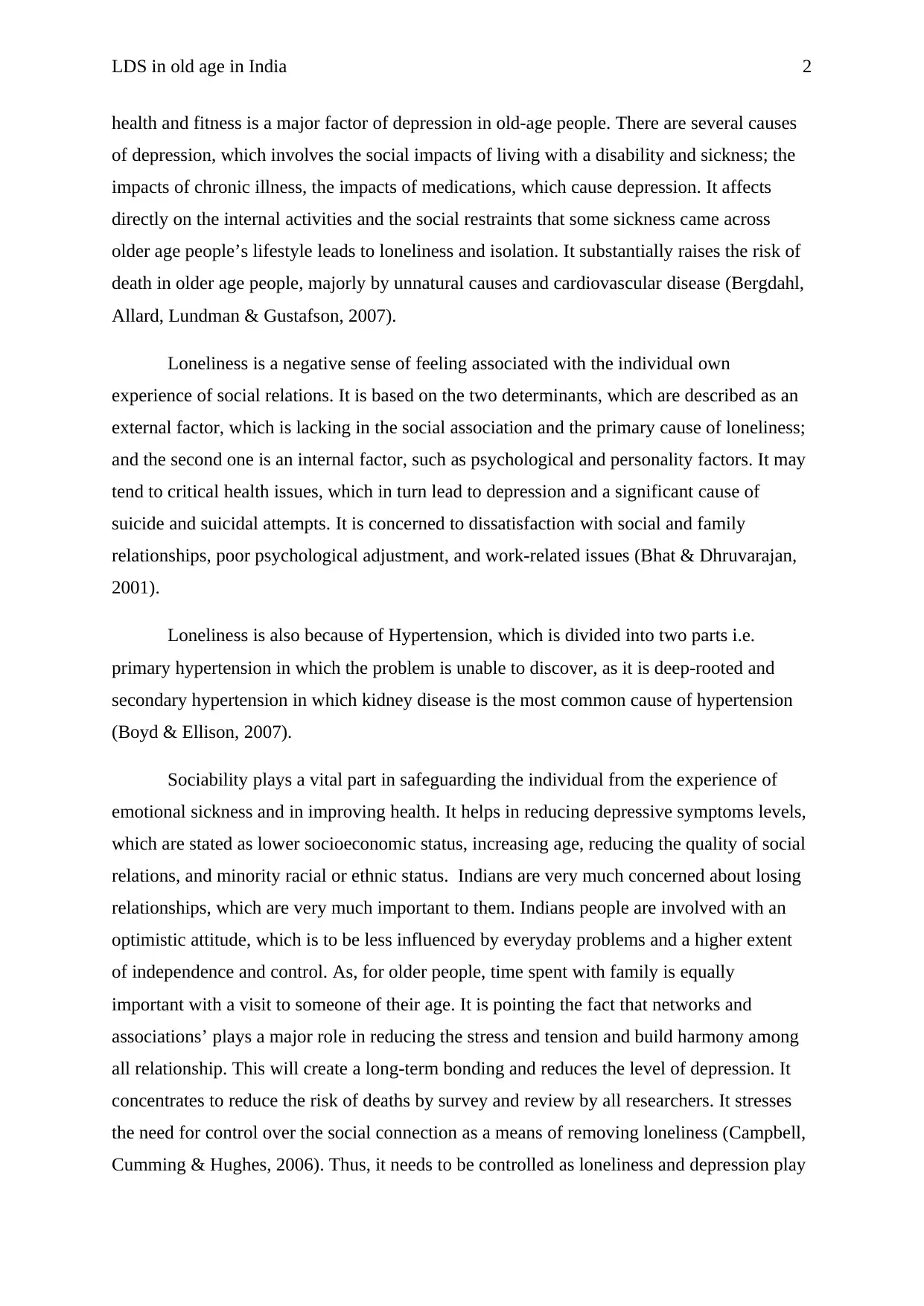
LDS in old age in India 2
health and fitness is a major factor of depression in old-age people. There are several causes
of depression, which involves the social impacts of living with a disability and sickness; the
impacts of chronic illness, the impacts of medications, which cause depression. It affects
directly on the internal activities and the social restraints that some sickness came across
older age people’s lifestyle leads to loneliness and isolation. It substantially raises the risk of
death in older age people, majorly by unnatural causes and cardiovascular disease (Bergdahl,
Allard, Lundman & Gustafson, 2007).
Loneliness is a negative sense of feeling associated with the individual own
experience of social relations. It is based on the two determinants, which are described as an
external factor, which is lacking in the social association and the primary cause of loneliness;
and the second one is an internal factor, such as psychological and personality factors. It may
tend to critical health issues, which in turn lead to depression and a significant cause of
suicide and suicidal attempts. It is concerned to dissatisfaction with social and family
relationships, poor psychological adjustment, and work-related issues (Bhat & Dhruvarajan,
2001).
Loneliness is also because of Hypertension, which is divided into two parts i.e.
primary hypertension in which the problem is unable to discover, as it is deep-rooted and
secondary hypertension in which kidney disease is the most common cause of hypertension
(Boyd & Ellison, 2007).
Sociability plays a vital part in safeguarding the individual from the experience of
emotional sickness and in improving health. It helps in reducing depressive symptoms levels,
which are stated as lower socioeconomic status, increasing age, reducing the quality of social
relations, and minority racial or ethnic status. Indians are very much concerned about losing
relationships, which are very much important to them. Indians people are involved with an
optimistic attitude, which is to be less influenced by everyday problems and a higher extent
of independence and control. As, for older people, time spent with family is equally
important with a visit to someone of their age. It is pointing the fact that networks and
associations’ plays a major role in reducing the stress and tension and build harmony among
all relationship. This will create a long-term bonding and reduces the level of depression. It
concentrates to reduce the risk of deaths by survey and review by all researchers. It stresses
the need for control over the social connection as a means of removing loneliness (Campbell,
Cumming & Hughes, 2006). Thus, it needs to be controlled as loneliness and depression play
health and fitness is a major factor of depression in old-age people. There are several causes
of depression, which involves the social impacts of living with a disability and sickness; the
impacts of chronic illness, the impacts of medications, which cause depression. It affects
directly on the internal activities and the social restraints that some sickness came across
older age people’s lifestyle leads to loneliness and isolation. It substantially raises the risk of
death in older age people, majorly by unnatural causes and cardiovascular disease (Bergdahl,
Allard, Lundman & Gustafson, 2007).
Loneliness is a negative sense of feeling associated with the individual own
experience of social relations. It is based on the two determinants, which are described as an
external factor, which is lacking in the social association and the primary cause of loneliness;
and the second one is an internal factor, such as psychological and personality factors. It may
tend to critical health issues, which in turn lead to depression and a significant cause of
suicide and suicidal attempts. It is concerned to dissatisfaction with social and family
relationships, poor psychological adjustment, and work-related issues (Bhat & Dhruvarajan,
2001).
Loneliness is also because of Hypertension, which is divided into two parts i.e.
primary hypertension in which the problem is unable to discover, as it is deep-rooted and
secondary hypertension in which kidney disease is the most common cause of hypertension
(Boyd & Ellison, 2007).
Sociability plays a vital part in safeguarding the individual from the experience of
emotional sickness and in improving health. It helps in reducing depressive symptoms levels,
which are stated as lower socioeconomic status, increasing age, reducing the quality of social
relations, and minority racial or ethnic status. Indians are very much concerned about losing
relationships, which are very much important to them. Indians people are involved with an
optimistic attitude, which is to be less influenced by everyday problems and a higher extent
of independence and control. As, for older people, time spent with family is equally
important with a visit to someone of their age. It is pointing the fact that networks and
associations’ plays a major role in reducing the stress and tension and build harmony among
all relationship. This will create a long-term bonding and reduces the level of depression. It
concentrates to reduce the risk of deaths by survey and review by all researchers. It stresses
the need for control over the social connection as a means of removing loneliness (Campbell,
Cumming & Hughes, 2006). Thus, it needs to be controlled as loneliness and depression play
⊘ This is a preview!⊘
Do you want full access?
Subscribe today to unlock all pages.

Trusted by 1+ million students worldwide
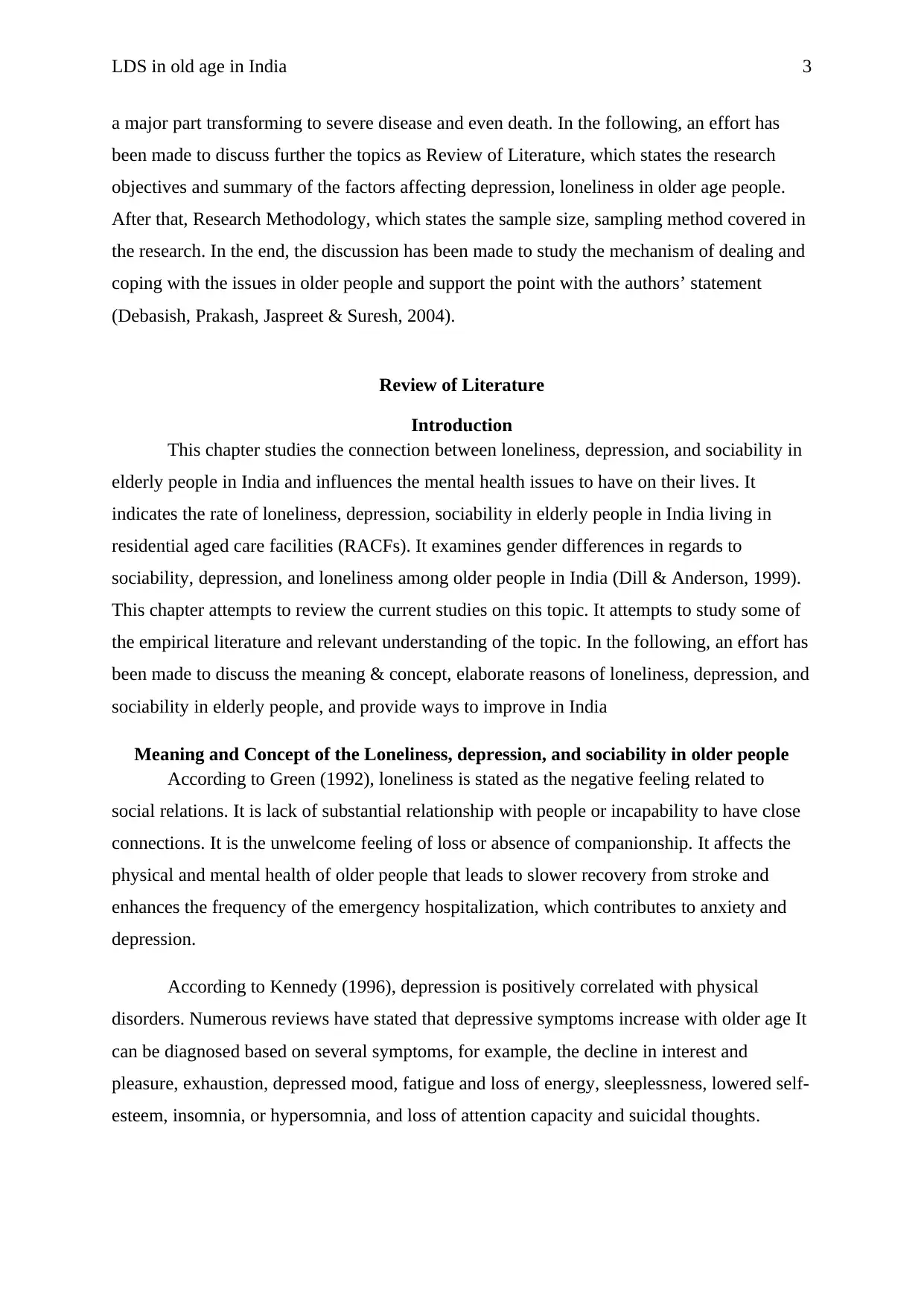
LDS in old age in India 3
a major part transforming to severe disease and even death. In the following, an effort has
been made to discuss further the topics as Review of Literature, which states the research
objectives and summary of the factors affecting depression, loneliness in older age people.
After that, Research Methodology, which states the sample size, sampling method covered in
the research. In the end, the discussion has been made to study the mechanism of dealing and
coping with the issues in older people and support the point with the authors’ statement
(Debasish, Prakash, Jaspreet & Suresh, 2004).
Review of Literature
Introduction
This chapter studies the connection between loneliness, depression, and sociability in
elderly people in India and influences the mental health issues to have on their lives. It
indicates the rate of loneliness, depression, sociability in elderly people in India living in
residential aged care facilities (RACFs). It examines gender differences in regards to
sociability, depression, and loneliness among older people in India (Dill & Anderson, 1999).
This chapter attempts to review the current studies on this topic. It attempts to study some of
the empirical literature and relevant understanding of the topic. In the following, an effort has
been made to discuss the meaning & concept, elaborate reasons of loneliness, depression, and
sociability in elderly people, and provide ways to improve in India
Meaning and Concept of the Loneliness, depression, and sociability in older people
According to Green (1992), loneliness is stated as the negative feeling related to
social relations. It is lack of substantial relationship with people or incapability to have close
connections. It is the unwelcome feeling of loss or absence of companionship. It affects the
physical and mental health of older people that leads to slower recovery from stroke and
enhances the frequency of the emergency hospitalization, which contributes to anxiety and
depression.
According to Kennedy (1996), depression is positively correlated with physical
disorders. Numerous reviews have stated that depressive symptoms increase with older age It
can be diagnosed based on several symptoms, for example, the decline in interest and
pleasure, exhaustion, depressed mood, fatigue and loss of energy, sleeplessness, lowered self-
esteem, insomnia, or hypersomnia, and loss of attention capacity and suicidal thoughts.
a major part transforming to severe disease and even death. In the following, an effort has
been made to discuss further the topics as Review of Literature, which states the research
objectives and summary of the factors affecting depression, loneliness in older age people.
After that, Research Methodology, which states the sample size, sampling method covered in
the research. In the end, the discussion has been made to study the mechanism of dealing and
coping with the issues in older people and support the point with the authors’ statement
(Debasish, Prakash, Jaspreet & Suresh, 2004).
Review of Literature
Introduction
This chapter studies the connection between loneliness, depression, and sociability in
elderly people in India and influences the mental health issues to have on their lives. It
indicates the rate of loneliness, depression, sociability in elderly people in India living in
residential aged care facilities (RACFs). It examines gender differences in regards to
sociability, depression, and loneliness among older people in India (Dill & Anderson, 1999).
This chapter attempts to review the current studies on this topic. It attempts to study some of
the empirical literature and relevant understanding of the topic. In the following, an effort has
been made to discuss the meaning & concept, elaborate reasons of loneliness, depression, and
sociability in elderly people, and provide ways to improve in India
Meaning and Concept of the Loneliness, depression, and sociability in older people
According to Green (1992), loneliness is stated as the negative feeling related to
social relations. It is lack of substantial relationship with people or incapability to have close
connections. It is the unwelcome feeling of loss or absence of companionship. It affects the
physical and mental health of older people that leads to slower recovery from stroke and
enhances the frequency of the emergency hospitalization, which contributes to anxiety and
depression.
According to Kennedy (1996), depression is positively correlated with physical
disorders. Numerous reviews have stated that depressive symptoms increase with older age It
can be diagnosed based on several symptoms, for example, the decline in interest and
pleasure, exhaustion, depressed mood, fatigue and loss of energy, sleeplessness, lowered self-
esteem, insomnia, or hypersomnia, and loss of attention capacity and suicidal thoughts.
Paraphrase This Document
Need a fresh take? Get an instant paraphrase of this document with our AI Paraphraser
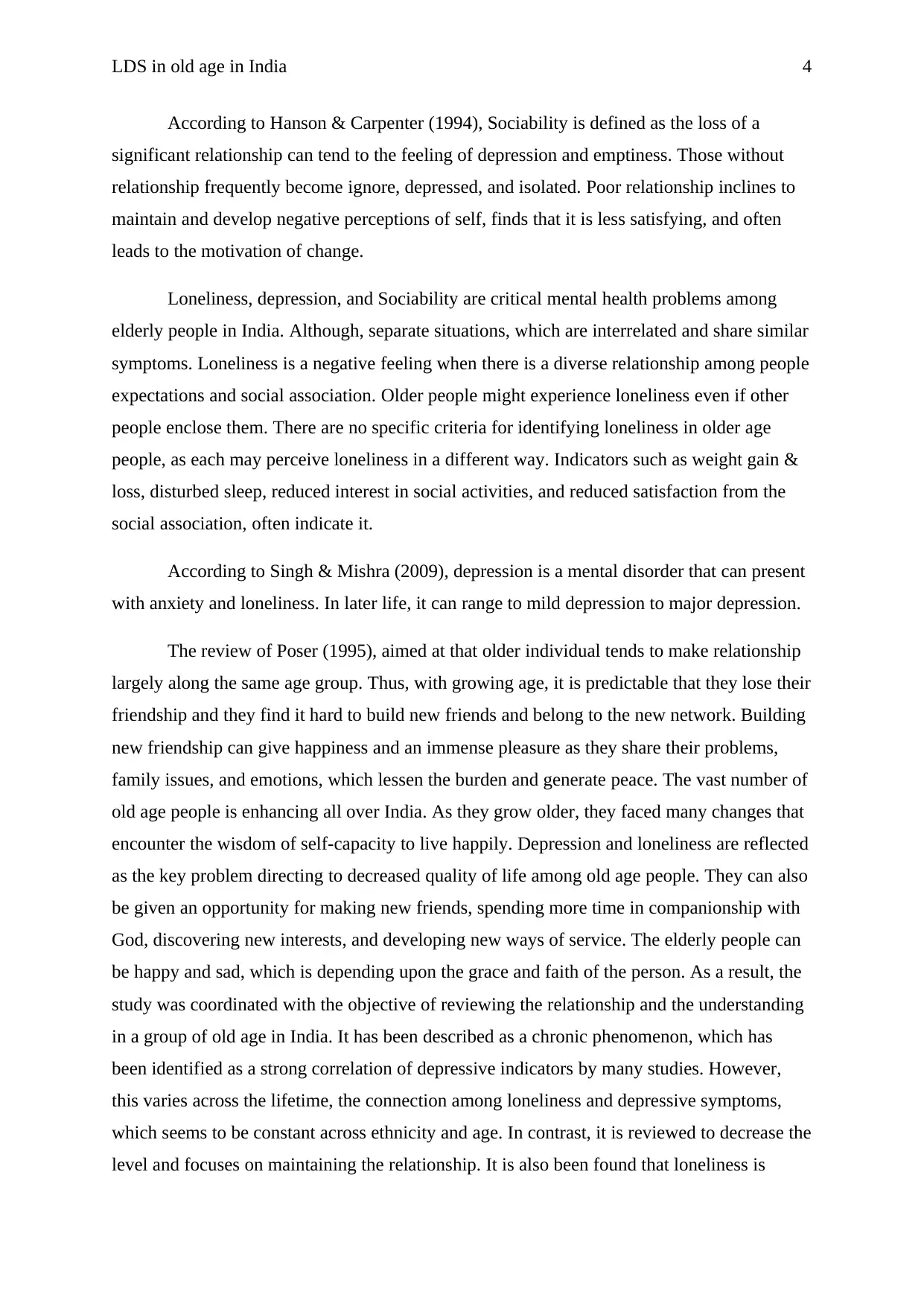
LDS in old age in India 4
According to Hanson & Carpenter (1994), Sociability is defined as the loss of a
significant relationship can tend to the feeling of depression and emptiness. Those without
relationship frequently become ignore, depressed, and isolated. Poor relationship inclines to
maintain and develop negative perceptions of self, finds that it is less satisfying, and often
leads to the motivation of change.
Loneliness, depression, and Sociability are critical mental health problems among
elderly people in India. Although, separate situations, which are interrelated and share similar
symptoms. Loneliness is a negative feeling when there is a diverse relationship among people
expectations and social association. Older people might experience loneliness even if other
people enclose them. There are no specific criteria for identifying loneliness in older age
people, as each may perceive loneliness in a different way. Indicators such as weight gain &
loss, disturbed sleep, reduced interest in social activities, and reduced satisfaction from the
social association, often indicate it.
According to Singh & Mishra (2009), depression is a mental disorder that can present
with anxiety and loneliness. In later life, it can range to mild depression to major depression.
The review of Poser (1995), aimed at that older individual tends to make relationship
largely along the same age group. Thus, with growing age, it is predictable that they lose their
friendship and they find it hard to build new friends and belong to the new network. Building
new friendship can give happiness and an immense pleasure as they share their problems,
family issues, and emotions, which lessen the burden and generate peace. The vast number of
old age people is enhancing all over India. As they grow older, they faced many changes that
encounter the wisdom of self-capacity to live happily. Depression and loneliness are reflected
as the key problem directing to decreased quality of life among old age people. They can also
be given an opportunity for making new friends, spending more time in companionship with
God, discovering new interests, and developing new ways of service. The elderly people can
be happy and sad, which is depending upon the grace and faith of the person. As a result, the
study was coordinated with the objective of reviewing the relationship and the understanding
in a group of old age in India. It has been described as a chronic phenomenon, which has
been identified as a strong correlation of depressive indicators by many studies. However,
this varies across the lifetime, the connection among loneliness and depressive symptoms,
which seems to be constant across ethnicity and age. In contrast, it is reviewed to decrease the
level and focuses on maintaining the relationship. It is also been found that loneliness is
According to Hanson & Carpenter (1994), Sociability is defined as the loss of a
significant relationship can tend to the feeling of depression and emptiness. Those without
relationship frequently become ignore, depressed, and isolated. Poor relationship inclines to
maintain and develop negative perceptions of self, finds that it is less satisfying, and often
leads to the motivation of change.
Loneliness, depression, and Sociability are critical mental health problems among
elderly people in India. Although, separate situations, which are interrelated and share similar
symptoms. Loneliness is a negative feeling when there is a diverse relationship among people
expectations and social association. Older people might experience loneliness even if other
people enclose them. There are no specific criteria for identifying loneliness in older age
people, as each may perceive loneliness in a different way. Indicators such as weight gain &
loss, disturbed sleep, reduced interest in social activities, and reduced satisfaction from the
social association, often indicate it.
According to Singh & Mishra (2009), depression is a mental disorder that can present
with anxiety and loneliness. In later life, it can range to mild depression to major depression.
The review of Poser (1995), aimed at that older individual tends to make relationship
largely along the same age group. Thus, with growing age, it is predictable that they lose their
friendship and they find it hard to build new friends and belong to the new network. Building
new friendship can give happiness and an immense pleasure as they share their problems,
family issues, and emotions, which lessen the burden and generate peace. The vast number of
old age people is enhancing all over India. As they grow older, they faced many changes that
encounter the wisdom of self-capacity to live happily. Depression and loneliness are reflected
as the key problem directing to decreased quality of life among old age people. They can also
be given an opportunity for making new friends, spending more time in companionship with
God, discovering new interests, and developing new ways of service. The elderly people can
be happy and sad, which is depending upon the grace and faith of the person. As a result, the
study was coordinated with the objective of reviewing the relationship and the understanding
in a group of old age in India. It has been described as a chronic phenomenon, which has
been identified as a strong correlation of depressive indicators by many studies. However,
this varies across the lifetime, the connection among loneliness and depressive symptoms,
which seems to be constant across ethnicity and age. In contrast, it is reviewed to decrease the
level and focuses on maintaining the relationship. It is also been found that loneliness is
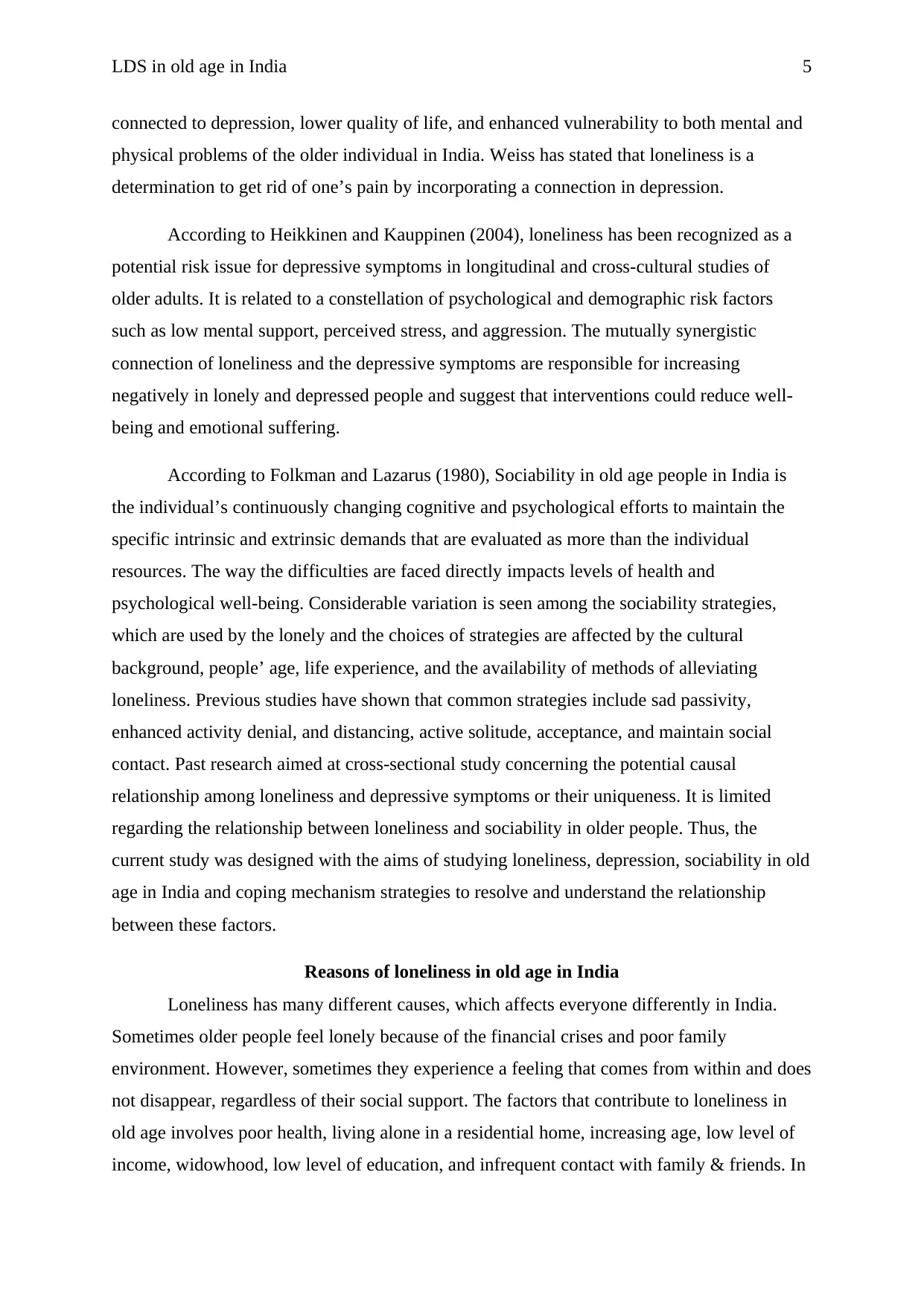
LDS in old age in India 5
connected to depression, lower quality of life, and enhanced vulnerability to both mental and
physical problems of the older individual in India. Weiss has stated that loneliness is a
determination to get rid of one’s pain by incorporating a connection in depression.
According to Heikkinen and Kauppinen (2004), loneliness has been recognized as a
potential risk issue for depressive symptoms in longitudinal and cross-cultural studies of
older adults. It is related to a constellation of psychological and demographic risk factors
such as low mental support, perceived stress, and aggression. The mutually synergistic
connection of loneliness and the depressive symptoms are responsible for increasing
negatively in lonely and depressed people and suggest that interventions could reduce well-
being and emotional suffering.
According to Folkman and Lazarus (1980), Sociability in old age people in India is
the individual’s continuously changing cognitive and psychological efforts to maintain the
specific intrinsic and extrinsic demands that are evaluated as more than the individual
resources. The way the difficulties are faced directly impacts levels of health and
psychological well-being. Considerable variation is seen among the sociability strategies,
which are used by the lonely and the choices of strategies are affected by the cultural
background, people’ age, life experience, and the availability of methods of alleviating
loneliness. Previous studies have shown that common strategies include sad passivity,
enhanced activity denial, and distancing, active solitude, acceptance, and maintain social
contact. Past research aimed at cross-sectional study concerning the potential causal
relationship among loneliness and depressive symptoms or their uniqueness. It is limited
regarding the relationship between loneliness and sociability in older people. Thus, the
current study was designed with the aims of studying loneliness, depression, sociability in old
age in India and coping mechanism strategies to resolve and understand the relationship
between these factors.
Reasons of loneliness in old age in India
Loneliness has many different causes, which affects everyone differently in India.
Sometimes older people feel lonely because of the financial crises and poor family
environment. However, sometimes they experience a feeling that comes from within and does
not disappear, regardless of their social support. The factors that contribute to loneliness in
old age involves poor health, living alone in a residential home, increasing age, low level of
income, widowhood, low level of education, and infrequent contact with family & friends. In
connected to depression, lower quality of life, and enhanced vulnerability to both mental and
physical problems of the older individual in India. Weiss has stated that loneliness is a
determination to get rid of one’s pain by incorporating a connection in depression.
According to Heikkinen and Kauppinen (2004), loneliness has been recognized as a
potential risk issue for depressive symptoms in longitudinal and cross-cultural studies of
older adults. It is related to a constellation of psychological and demographic risk factors
such as low mental support, perceived stress, and aggression. The mutually synergistic
connection of loneliness and the depressive symptoms are responsible for increasing
negatively in lonely and depressed people and suggest that interventions could reduce well-
being and emotional suffering.
According to Folkman and Lazarus (1980), Sociability in old age people in India is
the individual’s continuously changing cognitive and psychological efforts to maintain the
specific intrinsic and extrinsic demands that are evaluated as more than the individual
resources. The way the difficulties are faced directly impacts levels of health and
psychological well-being. Considerable variation is seen among the sociability strategies,
which are used by the lonely and the choices of strategies are affected by the cultural
background, people’ age, life experience, and the availability of methods of alleviating
loneliness. Previous studies have shown that common strategies include sad passivity,
enhanced activity denial, and distancing, active solitude, acceptance, and maintain social
contact. Past research aimed at cross-sectional study concerning the potential causal
relationship among loneliness and depressive symptoms or their uniqueness. It is limited
regarding the relationship between loneliness and sociability in older people. Thus, the
current study was designed with the aims of studying loneliness, depression, sociability in old
age in India and coping mechanism strategies to resolve and understand the relationship
between these factors.
Reasons of loneliness in old age in India
Loneliness has many different causes, which affects everyone differently in India.
Sometimes older people feel lonely because of the financial crises and poor family
environment. However, sometimes they experience a feeling that comes from within and does
not disappear, regardless of their social support. The factors that contribute to loneliness in
old age involves poor health, living alone in a residential home, increasing age, low level of
income, widowhood, low level of education, and infrequent contact with family & friends. In
⊘ This is a preview!⊘
Do you want full access?
Subscribe today to unlock all pages.

Trusted by 1+ million students worldwide
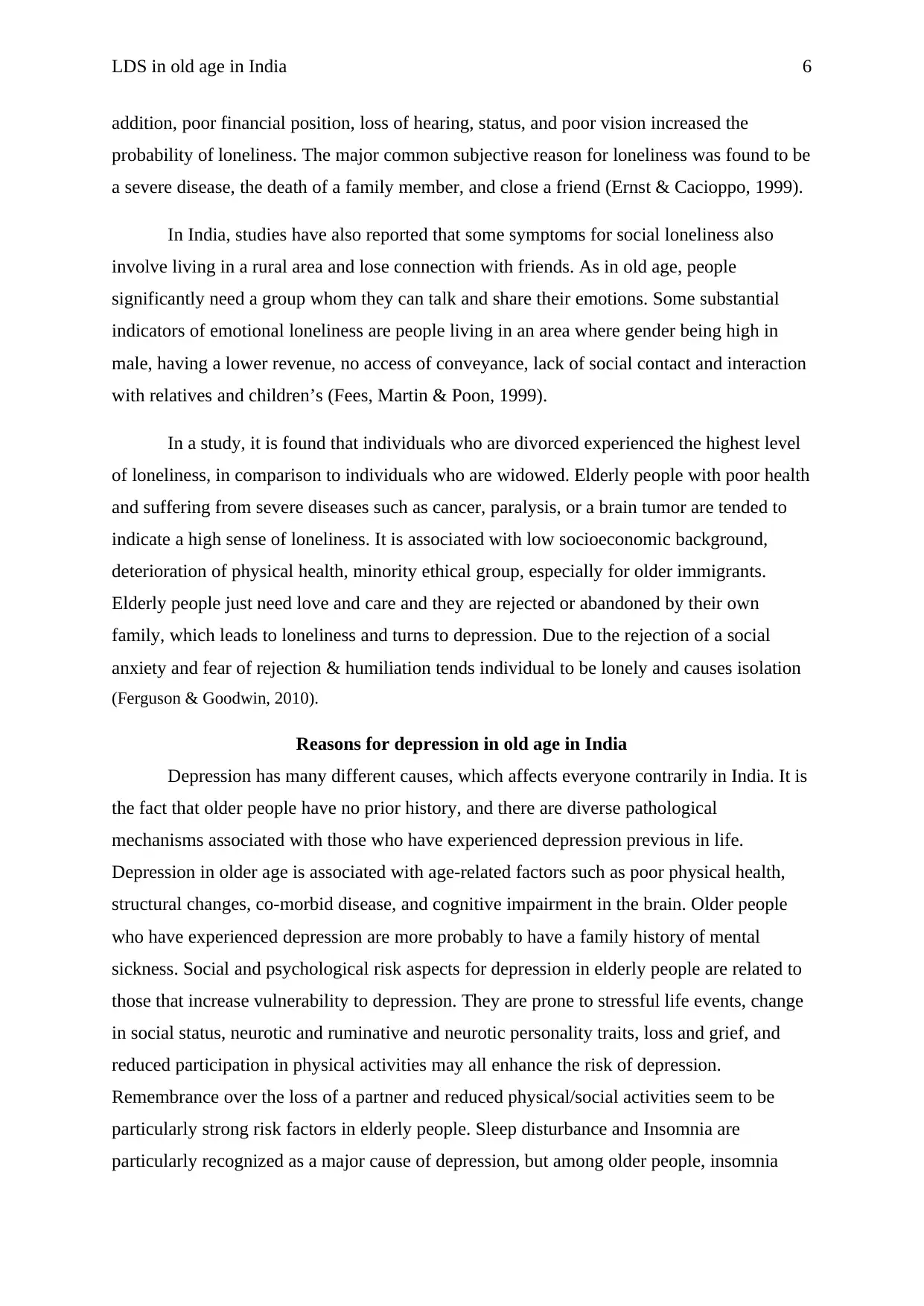
LDS in old age in India 6
addition, poor financial position, loss of hearing, status, and poor vision increased the
probability of loneliness. The major common subjective reason for loneliness was found to be
a severe disease, the death of a family member, and close a friend (Ernst & Cacioppo, 1999).
In India, studies have also reported that some symptoms for social loneliness also
involve living in a rural area and lose connection with friends. As in old age, people
significantly need a group whom they can talk and share their emotions. Some substantial
indicators of emotional loneliness are people living in an area where gender being high in
male, having a lower revenue, no access of conveyance, lack of social contact and interaction
with relatives and children’s (Fees, Martin & Poon, 1999).
In a study, it is found that individuals who are divorced experienced the highest level
of loneliness, in comparison to individuals who are widowed. Elderly people with poor health
and suffering from severe diseases such as cancer, paralysis, or a brain tumor are tended to
indicate a high sense of loneliness. It is associated with low socioeconomic background,
deterioration of physical health, minority ethical group, especially for older immigrants.
Elderly people just need love and care and they are rejected or abandoned by their own
family, which leads to loneliness and turns to depression. Due to the rejection of a social
anxiety and fear of rejection & humiliation tends individual to be lonely and causes isolation
(Ferguson & Goodwin, 2010).
Reasons for depression in old age in India
Depression has many different causes, which affects everyone contrarily in India. It is
the fact that older people have no prior history, and there are diverse pathological
mechanisms associated with those who have experienced depression previous in life.
Depression in older age is associated with age-related factors such as poor physical health,
structural changes, co-morbid disease, and cognitive impairment in the brain. Older people
who have experienced depression are more probably to have a family history of mental
sickness. Social and psychological risk aspects for depression in elderly people are related to
those that increase vulnerability to depression. They are prone to stressful life events, change
in social status, neurotic and ruminative and neurotic personality traits, loss and grief, and
reduced participation in physical activities may all enhance the risk of depression.
Remembrance over the loss of a partner and reduced physical/social activities seem to be
particularly strong risk factors in elderly people. Sleep disturbance and Insomnia are
particularly recognized as a major cause of depression, but among older people, insomnia
addition, poor financial position, loss of hearing, status, and poor vision increased the
probability of loneliness. The major common subjective reason for loneliness was found to be
a severe disease, the death of a family member, and close a friend (Ernst & Cacioppo, 1999).
In India, studies have also reported that some symptoms for social loneliness also
involve living in a rural area and lose connection with friends. As in old age, people
significantly need a group whom they can talk and share their emotions. Some substantial
indicators of emotional loneliness are people living in an area where gender being high in
male, having a lower revenue, no access of conveyance, lack of social contact and interaction
with relatives and children’s (Fees, Martin & Poon, 1999).
In a study, it is found that individuals who are divorced experienced the highest level
of loneliness, in comparison to individuals who are widowed. Elderly people with poor health
and suffering from severe diseases such as cancer, paralysis, or a brain tumor are tended to
indicate a high sense of loneliness. It is associated with low socioeconomic background,
deterioration of physical health, minority ethical group, especially for older immigrants.
Elderly people just need love and care and they are rejected or abandoned by their own
family, which leads to loneliness and turns to depression. Due to the rejection of a social
anxiety and fear of rejection & humiliation tends individual to be lonely and causes isolation
(Ferguson & Goodwin, 2010).
Reasons for depression in old age in India
Depression has many different causes, which affects everyone contrarily in India. It is
the fact that older people have no prior history, and there are diverse pathological
mechanisms associated with those who have experienced depression previous in life.
Depression in older age is associated with age-related factors such as poor physical health,
structural changes, co-morbid disease, and cognitive impairment in the brain. Older people
who have experienced depression are more probably to have a family history of mental
sickness. Social and psychological risk aspects for depression in elderly people are related to
those that increase vulnerability to depression. They are prone to stressful life events, change
in social status, neurotic and ruminative and neurotic personality traits, loss and grief, and
reduced participation in physical activities may all enhance the risk of depression.
Remembrance over the loss of a partner and reduced physical/social activities seem to be
particularly strong risk factors in elderly people. Sleep disturbance and Insomnia are
particularly recognized as a major cause of depression, but among older people, insomnia
Paraphrase This Document
Need a fresh take? Get an instant paraphrase of this document with our AI Paraphraser
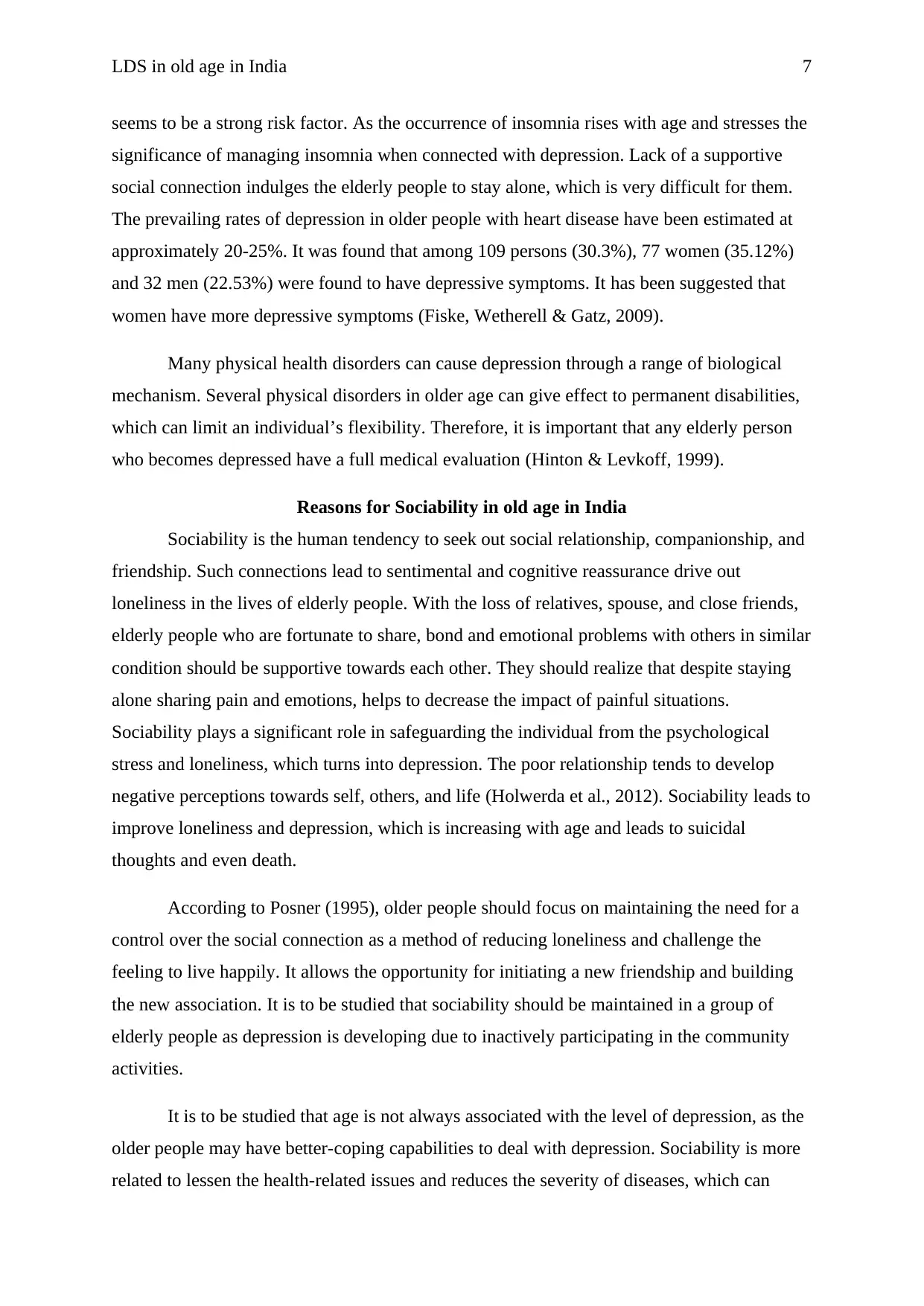
LDS in old age in India 7
seems to be a strong risk factor. As the occurrence of insomnia rises with age and stresses the
significance of managing insomnia when connected with depression. Lack of a supportive
social connection indulges the elderly people to stay alone, which is very difficult for them.
The prevailing rates of depression in older people with heart disease have been estimated at
approximately 20-25%. It was found that among 109 persons (30.3%), 77 women (35.12%)
and 32 men (22.53%) were found to have depressive symptoms. It has been suggested that
women have more depressive symptoms (Fiske, Wetherell & Gatz, 2009).
Many physical health disorders can cause depression through a range of biological
mechanism. Several physical disorders in older age can give effect to permanent disabilities,
which can limit an individual’s flexibility. Therefore, it is important that any elderly person
who becomes depressed have a full medical evaluation (Hinton & Levkoff, 1999).
Reasons for Sociability in old age in India
Sociability is the human tendency to seek out social relationship, companionship, and
friendship. Such connections lead to sentimental and cognitive reassurance drive out
loneliness in the lives of elderly people. With the loss of relatives, spouse, and close friends,
elderly people who are fortunate to share, bond and emotional problems with others in similar
condition should be supportive towards each other. They should realize that despite staying
alone sharing pain and emotions, helps to decrease the impact of painful situations.
Sociability plays a significant role in safeguarding the individual from the psychological
stress and loneliness, which turns into depression. The poor relationship tends to develop
negative perceptions towards self, others, and life (Holwerda et al., 2012). Sociability leads to
improve loneliness and depression, which is increasing with age and leads to suicidal
thoughts and even death.
According to Posner (1995), older people should focus on maintaining the need for a
control over the social connection as a method of reducing loneliness and challenge the
feeling to live happily. It allows the opportunity for initiating a new friendship and building
the new association. It is to be studied that sociability should be maintained in a group of
elderly people as depression is developing due to inactively participating in the community
activities.
It is to be studied that age is not always associated with the level of depression, as the
older people may have better-coping capabilities to deal with depression. Sociability is more
related to lessen the health-related issues and reduces the severity of diseases, which can
seems to be a strong risk factor. As the occurrence of insomnia rises with age and stresses the
significance of managing insomnia when connected with depression. Lack of a supportive
social connection indulges the elderly people to stay alone, which is very difficult for them.
The prevailing rates of depression in older people with heart disease have been estimated at
approximately 20-25%. It was found that among 109 persons (30.3%), 77 women (35.12%)
and 32 men (22.53%) were found to have depressive symptoms. It has been suggested that
women have more depressive symptoms (Fiske, Wetherell & Gatz, 2009).
Many physical health disorders can cause depression through a range of biological
mechanism. Several physical disorders in older age can give effect to permanent disabilities,
which can limit an individual’s flexibility. Therefore, it is important that any elderly person
who becomes depressed have a full medical evaluation (Hinton & Levkoff, 1999).
Reasons for Sociability in old age in India
Sociability is the human tendency to seek out social relationship, companionship, and
friendship. Such connections lead to sentimental and cognitive reassurance drive out
loneliness in the lives of elderly people. With the loss of relatives, spouse, and close friends,
elderly people who are fortunate to share, bond and emotional problems with others in similar
condition should be supportive towards each other. They should realize that despite staying
alone sharing pain and emotions, helps to decrease the impact of painful situations.
Sociability plays a significant role in safeguarding the individual from the psychological
stress and loneliness, which turns into depression. The poor relationship tends to develop
negative perceptions towards self, others, and life (Holwerda et al., 2012). Sociability leads to
improve loneliness and depression, which is increasing with age and leads to suicidal
thoughts and even death.
According to Posner (1995), older people should focus on maintaining the need for a
control over the social connection as a method of reducing loneliness and challenge the
feeling to live happily. It allows the opportunity for initiating a new friendship and building
the new association. It is to be studied that sociability should be maintained in a group of
elderly people as depression is developing due to inactively participating in the community
activities.
It is to be studied that age is not always associated with the level of depression, as the
older people may have better-coping capabilities to deal with depression. Sociability is more
related to lessen the health-related issues and reduces the severity of diseases, which can
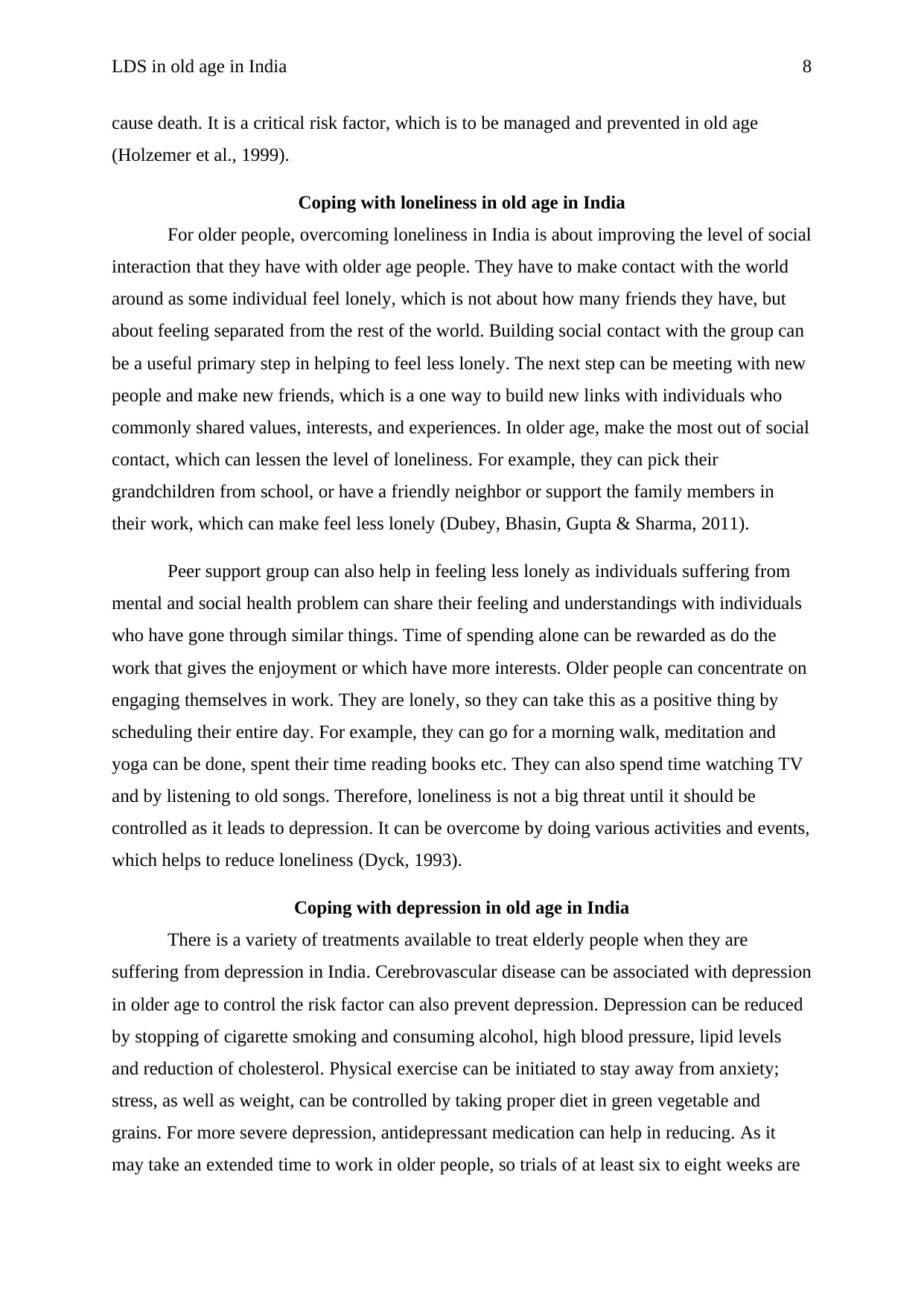
LDS in old age in India 8
cause death. It is a critical risk factor, which is to be managed and prevented in old age
(Holzemer et al., 1999).
Coping with loneliness in old age in India
For older people, overcoming loneliness in India is about improving the level of social
interaction that they have with older age people. They have to make contact with the world
around as some individual feel lonely, which is not about how many friends they have, but
about feeling separated from the rest of the world. Building social contact with the group can
be a useful primary step in helping to feel less lonely. The next step can be meeting with new
people and make new friends, which is a one way to build new links with individuals who
commonly shared values, interests, and experiences. In older age, make the most out of social
contact, which can lessen the level of loneliness. For example, they can pick their
grandchildren from school, or have a friendly neighbor or support the family members in
their work, which can make feel less lonely (Dubey, Bhasin, Gupta & Sharma, 2011).
Peer support group can also help in feeling less lonely as individuals suffering from
mental and social health problem can share their feeling and understandings with individuals
who have gone through similar things. Time of spending alone can be rewarded as do the
work that gives the enjoyment or which have more interests. Older people can concentrate on
engaging themselves in work. They are lonely, so they can take this as a positive thing by
scheduling their entire day. For example, they can go for a morning walk, meditation and
yoga can be done, spent their time reading books etc. They can also spend time watching TV
and by listening to old songs. Therefore, loneliness is not a big threat until it should be
controlled as it leads to depression. It can be overcome by doing various activities and events,
which helps to reduce loneliness (Dyck, 1993).
Coping with depression in old age in India
There is a variety of treatments available to treat elderly people when they are
suffering from depression in India. Cerebrovascular disease can be associated with depression
in older age to control the risk factor can also prevent depression. Depression can be reduced
by stopping of cigarette smoking and consuming alcohol, high blood pressure, lipid levels
and reduction of cholesterol. Physical exercise can be initiated to stay away from anxiety;
stress, as well as weight, can be controlled by taking proper diet in green vegetable and
grains. For more severe depression, antidepressant medication can help in reducing. As it
may take an extended time to work in older people, so trials of at least six to eight weeks are
cause death. It is a critical risk factor, which is to be managed and prevented in old age
(Holzemer et al., 1999).
Coping with loneliness in old age in India
For older people, overcoming loneliness in India is about improving the level of social
interaction that they have with older age people. They have to make contact with the world
around as some individual feel lonely, which is not about how many friends they have, but
about feeling separated from the rest of the world. Building social contact with the group can
be a useful primary step in helping to feel less lonely. The next step can be meeting with new
people and make new friends, which is a one way to build new links with individuals who
commonly shared values, interests, and experiences. In older age, make the most out of social
contact, which can lessen the level of loneliness. For example, they can pick their
grandchildren from school, or have a friendly neighbor or support the family members in
their work, which can make feel less lonely (Dubey, Bhasin, Gupta & Sharma, 2011).
Peer support group can also help in feeling less lonely as individuals suffering from
mental and social health problem can share their feeling and understandings with individuals
who have gone through similar things. Time of spending alone can be rewarded as do the
work that gives the enjoyment or which have more interests. Older people can concentrate on
engaging themselves in work. They are lonely, so they can take this as a positive thing by
scheduling their entire day. For example, they can go for a morning walk, meditation and
yoga can be done, spent their time reading books etc. They can also spend time watching TV
and by listening to old songs. Therefore, loneliness is not a big threat until it should be
controlled as it leads to depression. It can be overcome by doing various activities and events,
which helps to reduce loneliness (Dyck, 1993).
Coping with depression in old age in India
There is a variety of treatments available to treat elderly people when they are
suffering from depression in India. Cerebrovascular disease can be associated with depression
in older age to control the risk factor can also prevent depression. Depression can be reduced
by stopping of cigarette smoking and consuming alcohol, high blood pressure, lipid levels
and reduction of cholesterol. Physical exercise can be initiated to stay away from anxiety;
stress, as well as weight, can be controlled by taking proper diet in green vegetable and
grains. For more severe depression, antidepressant medication can help in reducing. As it
may take an extended time to work in older people, so trials of at least six to eight weeks are
⊘ This is a preview!⊘
Do you want full access?
Subscribe today to unlock all pages.

Trusted by 1+ million students worldwide
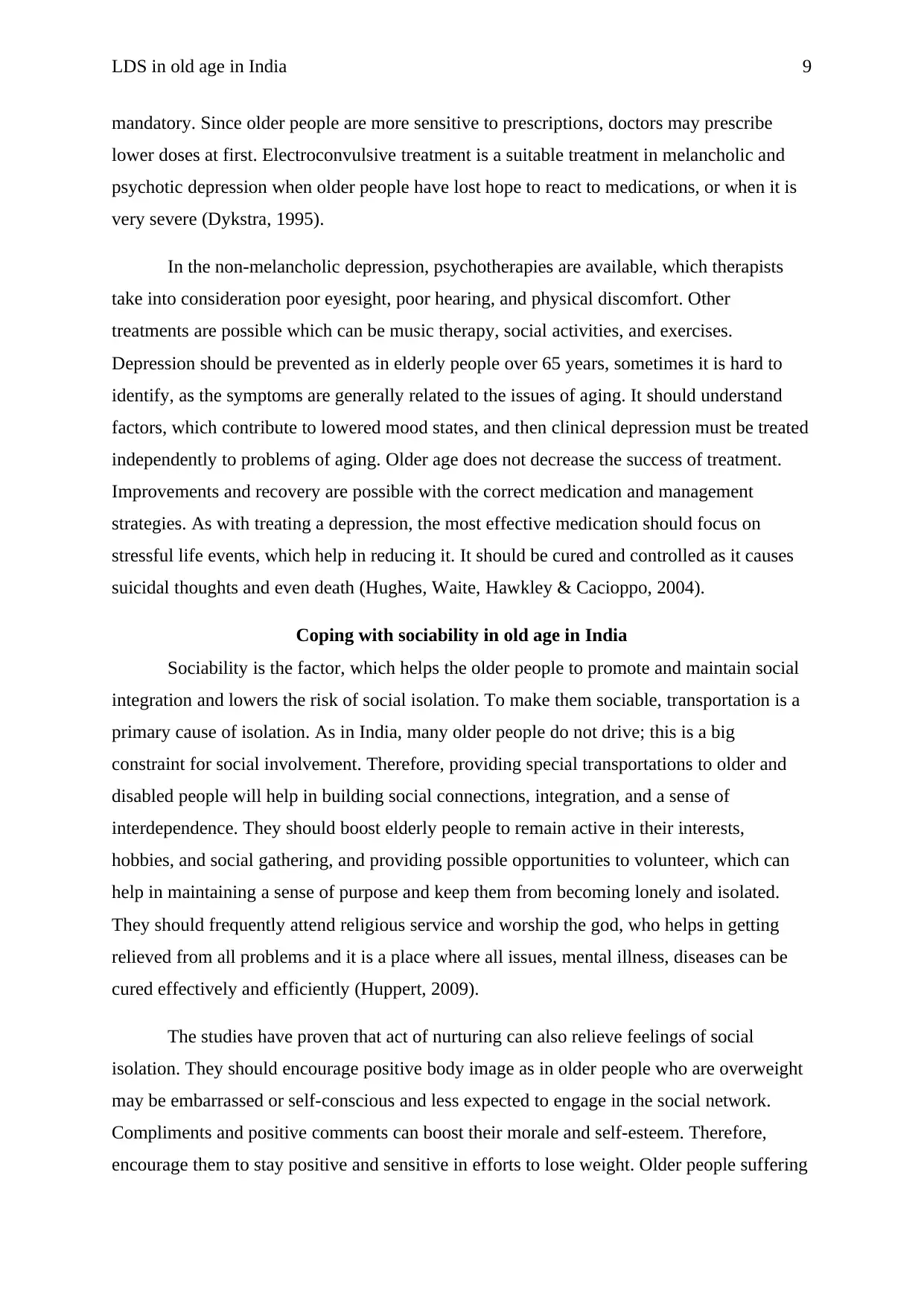
LDS in old age in India 9
mandatory. Since older people are more sensitive to prescriptions, doctors may prescribe
lower doses at first. Electroconvulsive treatment is a suitable treatment in melancholic and
psychotic depression when older people have lost hope to react to medications, or when it is
very severe (Dykstra, 1995).
In the non-melancholic depression, psychotherapies are available, which therapists
take into consideration poor eyesight, poor hearing, and physical discomfort. Other
treatments are possible which can be music therapy, social activities, and exercises.
Depression should be prevented as in elderly people over 65 years, sometimes it is hard to
identify, as the symptoms are generally related to the issues of aging. It should understand
factors, which contribute to lowered mood states, and then clinical depression must be treated
independently to problems of aging. Older age does not decrease the success of treatment.
Improvements and recovery are possible with the correct medication and management
strategies. As with treating a depression, the most effective medication should focus on
stressful life events, which help in reducing it. It should be cured and controlled as it causes
suicidal thoughts and even death (Hughes, Waite, Hawkley & Cacioppo, 2004).
Coping with sociability in old age in India
Sociability is the factor, which helps the older people to promote and maintain social
integration and lowers the risk of social isolation. To make them sociable, transportation is a
primary cause of isolation. As in India, many older people do not drive; this is a big
constraint for social involvement. Therefore, providing special transportations to older and
disabled people will help in building social connections, integration, and a sense of
interdependence. They should boost elderly people to remain active in their interests,
hobbies, and social gathering, and providing possible opportunities to volunteer, which can
help in maintaining a sense of purpose and keep them from becoming lonely and isolated.
They should frequently attend religious service and worship the god, who helps in getting
relieved from all problems and it is a place where all issues, mental illness, diseases can be
cured effectively and efficiently (Huppert, 2009).
The studies have proven that act of nurturing can also relieve feelings of social
isolation. They should encourage positive body image as in older people who are overweight
may be embarrassed or self-conscious and less expected to engage in the social network.
Compliments and positive comments can boost their morale and self-esteem. Therefore,
encourage them to stay positive and sensitive in efforts to lose weight. Older people suffering
mandatory. Since older people are more sensitive to prescriptions, doctors may prescribe
lower doses at first. Electroconvulsive treatment is a suitable treatment in melancholic and
psychotic depression when older people have lost hope to react to medications, or when it is
very severe (Dykstra, 1995).
In the non-melancholic depression, psychotherapies are available, which therapists
take into consideration poor eyesight, poor hearing, and physical discomfort. Other
treatments are possible which can be music therapy, social activities, and exercises.
Depression should be prevented as in elderly people over 65 years, sometimes it is hard to
identify, as the symptoms are generally related to the issues of aging. It should understand
factors, which contribute to lowered mood states, and then clinical depression must be treated
independently to problems of aging. Older age does not decrease the success of treatment.
Improvements and recovery are possible with the correct medication and management
strategies. As with treating a depression, the most effective medication should focus on
stressful life events, which help in reducing it. It should be cured and controlled as it causes
suicidal thoughts and even death (Hughes, Waite, Hawkley & Cacioppo, 2004).
Coping with sociability in old age in India
Sociability is the factor, which helps the older people to promote and maintain social
integration and lowers the risk of social isolation. To make them sociable, transportation is a
primary cause of isolation. As in India, many older people do not drive; this is a big
constraint for social involvement. Therefore, providing special transportations to older and
disabled people will help in building social connections, integration, and a sense of
interdependence. They should boost elderly people to remain active in their interests,
hobbies, and social gathering, and providing possible opportunities to volunteer, which can
help in maintaining a sense of purpose and keep them from becoming lonely and isolated.
They should frequently attend religious service and worship the god, who helps in getting
relieved from all problems and it is a place where all issues, mental illness, diseases can be
cured effectively and efficiently (Huppert, 2009).
The studies have proven that act of nurturing can also relieve feelings of social
isolation. They should encourage positive body image as in older people who are overweight
may be embarrassed or self-conscious and less expected to engage in the social network.
Compliments and positive comments can boost their morale and self-esteem. Therefore,
encourage them to stay positive and sensitive in efforts to lose weight. Older people suffering
Paraphrase This Document
Need a fresh take? Get an instant paraphrase of this document with our AI Paraphraser
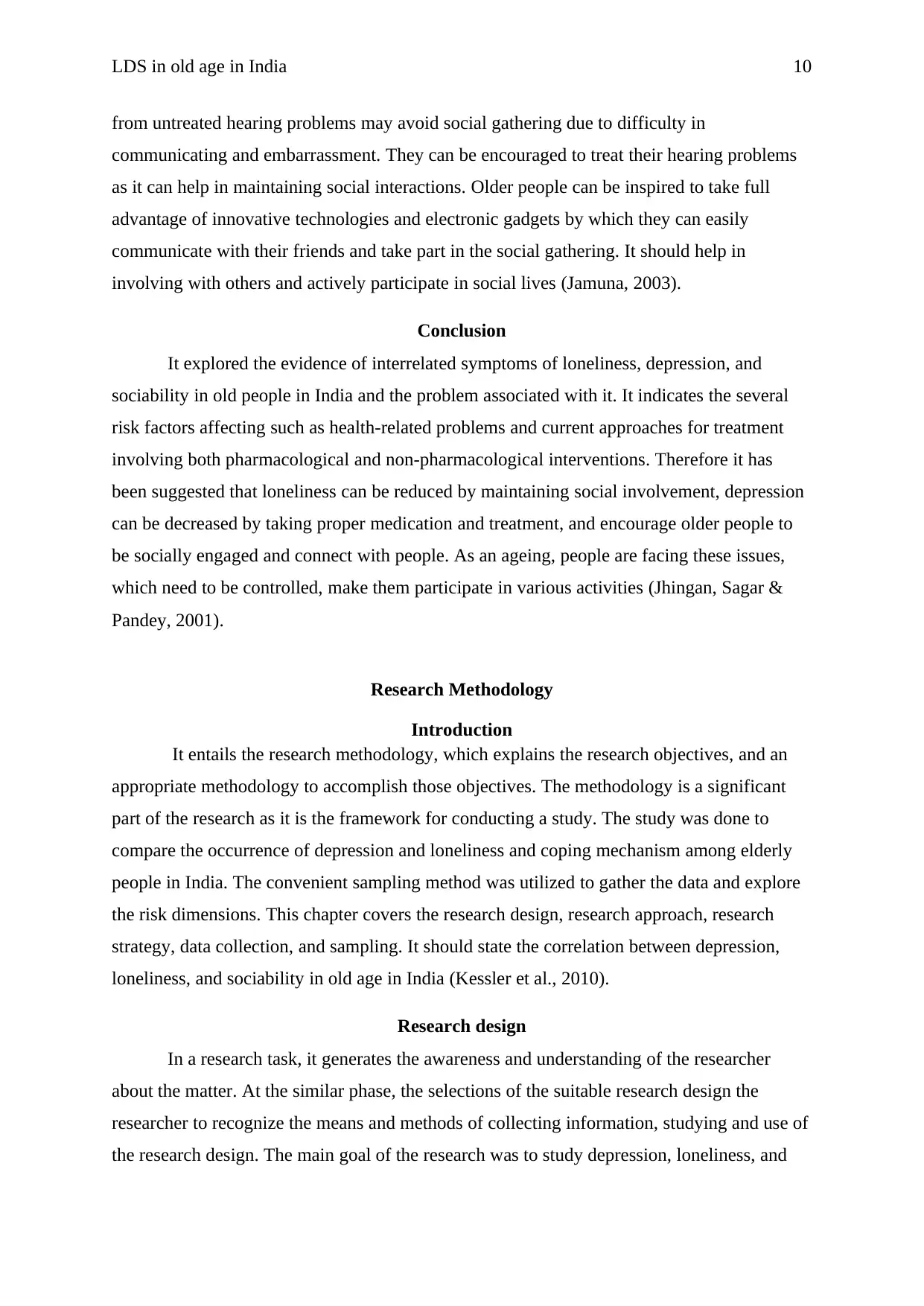
LDS in old age in India 10
from untreated hearing problems may avoid social gathering due to difficulty in
communicating and embarrassment. They can be encouraged to treat their hearing problems
as it can help in maintaining social interactions. Older people can be inspired to take full
advantage of innovative technologies and electronic gadgets by which they can easily
communicate with their friends and take part in the social gathering. It should help in
involving with others and actively participate in social lives (Jamuna, 2003).
Conclusion
It explored the evidence of interrelated symptoms of loneliness, depression, and
sociability in old people in India and the problem associated with it. It indicates the several
risk factors affecting such as health-related problems and current approaches for treatment
involving both pharmacological and non-pharmacological interventions. Therefore it has
been suggested that loneliness can be reduced by maintaining social involvement, depression
can be decreased by taking proper medication and treatment, and encourage older people to
be socially engaged and connect with people. As an ageing, people are facing these issues,
which need to be controlled, make them participate in various activities (Jhingan, Sagar &
Pandey, 2001).
Research Methodology
Introduction
It entails the research methodology, which explains the research objectives, and an
appropriate methodology to accomplish those objectives. The methodology is a significant
part of the research as it is the framework for conducting a study. The study was done to
compare the occurrence of depression and loneliness and coping mechanism among elderly
people in India. The convenient sampling method was utilized to gather the data and explore
the risk dimensions. This chapter covers the research design, research approach, research
strategy, data collection, and sampling. It should state the correlation between depression,
loneliness, and sociability in old age in India (Kessler et al., 2010).
Research design
In a research task, it generates the awareness and understanding of the researcher
about the matter. At the similar phase, the selections of the suitable research design the
researcher to recognize the means and methods of collecting information, studying and use of
the research design. The main goal of the research was to study depression, loneliness, and
from untreated hearing problems may avoid social gathering due to difficulty in
communicating and embarrassment. They can be encouraged to treat their hearing problems
as it can help in maintaining social interactions. Older people can be inspired to take full
advantage of innovative technologies and electronic gadgets by which they can easily
communicate with their friends and take part in the social gathering. It should help in
involving with others and actively participate in social lives (Jamuna, 2003).
Conclusion
It explored the evidence of interrelated symptoms of loneliness, depression, and
sociability in old people in India and the problem associated with it. It indicates the several
risk factors affecting such as health-related problems and current approaches for treatment
involving both pharmacological and non-pharmacological interventions. Therefore it has
been suggested that loneliness can be reduced by maintaining social involvement, depression
can be decreased by taking proper medication and treatment, and encourage older people to
be socially engaged and connect with people. As an ageing, people are facing these issues,
which need to be controlled, make them participate in various activities (Jhingan, Sagar &
Pandey, 2001).
Research Methodology
Introduction
It entails the research methodology, which explains the research objectives, and an
appropriate methodology to accomplish those objectives. The methodology is a significant
part of the research as it is the framework for conducting a study. The study was done to
compare the occurrence of depression and loneliness and coping mechanism among elderly
people in India. The convenient sampling method was utilized to gather the data and explore
the risk dimensions. This chapter covers the research design, research approach, research
strategy, data collection, and sampling. It should state the correlation between depression,
loneliness, and sociability in old age in India (Kessler et al., 2010).
Research design
In a research task, it generates the awareness and understanding of the researcher
about the matter. At the similar phase, the selections of the suitable research design the
researcher to recognize the means and methods of collecting information, studying and use of
the research design. The main goal of the research was to study depression, loneliness, and
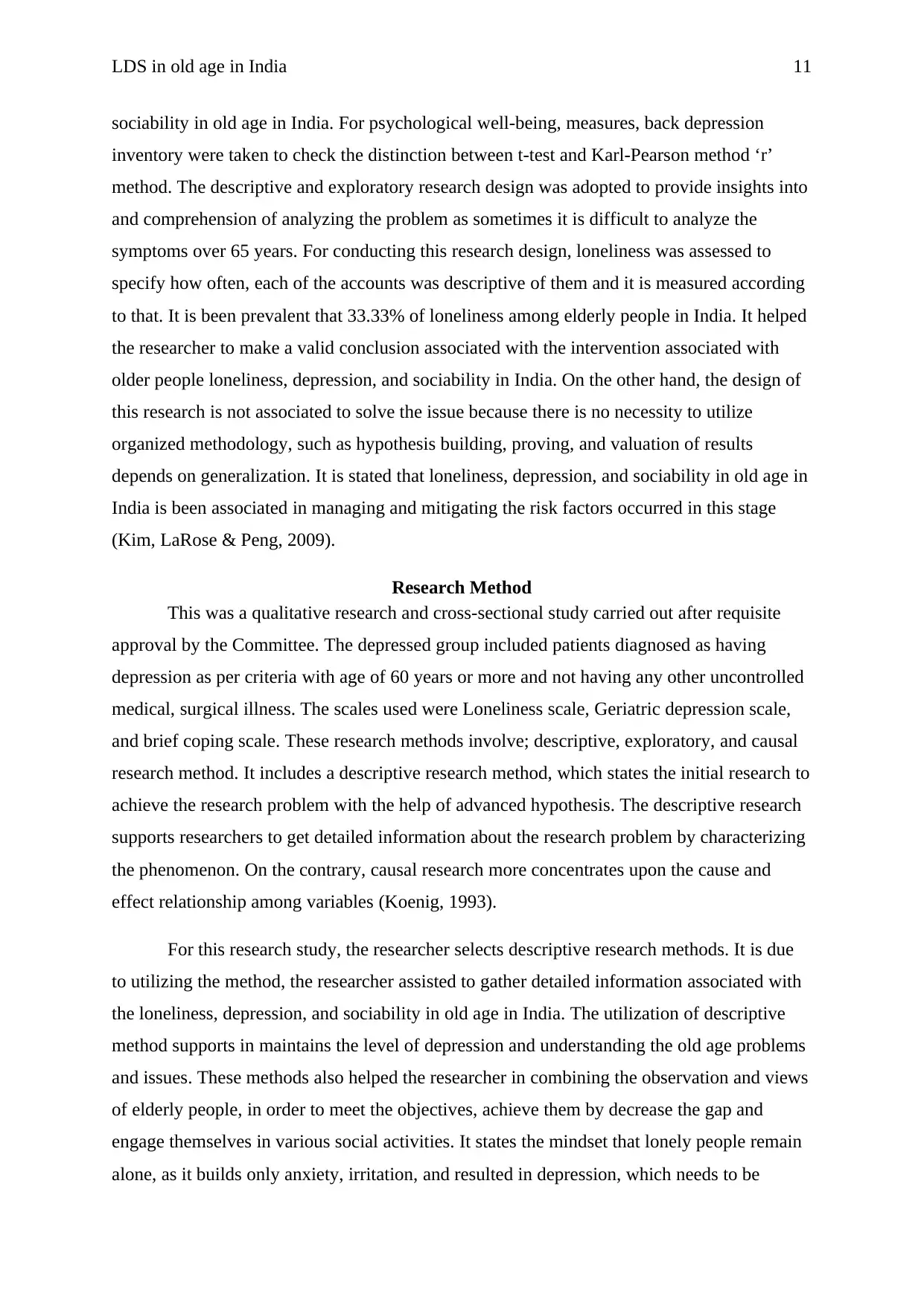
LDS in old age in India 11
sociability in old age in India. For psychological well-being, measures, back depression
inventory were taken to check the distinction between t-test and Karl-Pearson method ‘r’
method. The descriptive and exploratory research design was adopted to provide insights into
and comprehension of analyzing the problem as sometimes it is difficult to analyze the
symptoms over 65 years. For conducting this research design, loneliness was assessed to
specify how often, each of the accounts was descriptive of them and it is measured according
to that. It is been prevalent that 33.33% of loneliness among elderly people in India. It helped
the researcher to make a valid conclusion associated with the intervention associated with
older people loneliness, depression, and sociability in India. On the other hand, the design of
this research is not associated to solve the issue because there is no necessity to utilize
organized methodology, such as hypothesis building, proving, and valuation of results
depends on generalization. It is stated that loneliness, depression, and sociability in old age in
India is been associated in managing and mitigating the risk factors occurred in this stage
(Kim, LaRose & Peng, 2009).
Research Method
This was a qualitative research and cross-sectional study carried out after requisite
approval by the Committee. The depressed group included patients diagnosed as having
depression as per criteria with age of 60 years or more and not having any other uncontrolled
medical, surgical illness. The scales used were Loneliness scale, Geriatric depression scale,
and brief coping scale. These research methods involve; descriptive, exploratory, and causal
research method. It includes a descriptive research method, which states the initial research to
achieve the research problem with the help of advanced hypothesis. The descriptive research
supports researchers to get detailed information about the research problem by characterizing
the phenomenon. On the contrary, causal research more concentrates upon the cause and
effect relationship among variables (Koenig, 1993).
For this research study, the researcher selects descriptive research methods. It is due
to utilizing the method, the researcher assisted to gather detailed information associated with
the loneliness, depression, and sociability in old age in India. The utilization of descriptive
method supports in maintains the level of depression and understanding the old age problems
and issues. These methods also helped the researcher in combining the observation and views
of elderly people, in order to meet the objectives, achieve them by decrease the gap and
engage themselves in various social activities. It states the mindset that lonely people remain
alone, as it builds only anxiety, irritation, and resulted in depression, which needs to be
sociability in old age in India. For psychological well-being, measures, back depression
inventory were taken to check the distinction between t-test and Karl-Pearson method ‘r’
method. The descriptive and exploratory research design was adopted to provide insights into
and comprehension of analyzing the problem as sometimes it is difficult to analyze the
symptoms over 65 years. For conducting this research design, loneliness was assessed to
specify how often, each of the accounts was descriptive of them and it is measured according
to that. It is been prevalent that 33.33% of loneliness among elderly people in India. It helped
the researcher to make a valid conclusion associated with the intervention associated with
older people loneliness, depression, and sociability in India. On the other hand, the design of
this research is not associated to solve the issue because there is no necessity to utilize
organized methodology, such as hypothesis building, proving, and valuation of results
depends on generalization. It is stated that loneliness, depression, and sociability in old age in
India is been associated in managing and mitigating the risk factors occurred in this stage
(Kim, LaRose & Peng, 2009).
Research Method
This was a qualitative research and cross-sectional study carried out after requisite
approval by the Committee. The depressed group included patients diagnosed as having
depression as per criteria with age of 60 years or more and not having any other uncontrolled
medical, surgical illness. The scales used were Loneliness scale, Geriatric depression scale,
and brief coping scale. These research methods involve; descriptive, exploratory, and causal
research method. It includes a descriptive research method, which states the initial research to
achieve the research problem with the help of advanced hypothesis. The descriptive research
supports researchers to get detailed information about the research problem by characterizing
the phenomenon. On the contrary, causal research more concentrates upon the cause and
effect relationship among variables (Koenig, 1993).
For this research study, the researcher selects descriptive research methods. It is due
to utilizing the method, the researcher assisted to gather detailed information associated with
the loneliness, depression, and sociability in old age in India. The utilization of descriptive
method supports in maintains the level of depression and understanding the old age problems
and issues. These methods also helped the researcher in combining the observation and views
of elderly people, in order to meet the objectives, achieve them by decrease the gap and
engage themselves in various social activities. It states the mindset that lonely people remain
alone, as it builds only anxiety, irritation, and resulted in depression, which needs to be
⊘ This is a preview!⊘
Do you want full access?
Subscribe today to unlock all pages.

Trusted by 1+ million students worldwide
1 out of 30
Related Documents
Your All-in-One AI-Powered Toolkit for Academic Success.
+13062052269
info@desklib.com
Available 24*7 on WhatsApp / Email
![[object Object]](/_next/static/media/star-bottom.7253800d.svg)
Unlock your academic potential
Copyright © 2020–2025 A2Z Services. All Rights Reserved. Developed and managed by ZUCOL.





